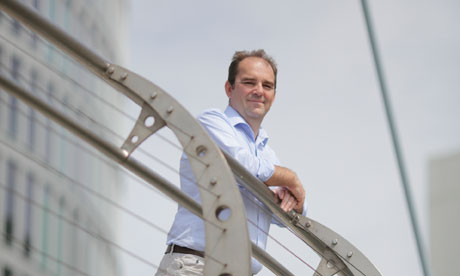
Chris Kendall was watching the news last June when he saw an item that changed his life. "It was about how the number of people who had altruistically donated an organ to a complete stranger had almost doubled in a year. I thought that was great. I hadn't realised people could do that," recalls Kendall, a father of four. "But then it said 'almost doubled . . . to 15'. When I heard that, I had a classic lightbulb moment: I thought, here's something I could do. It was something that could transform someone's life."
The realisation began a nine-month journey that culminated in him becoming one of the 23 people in England, Wales and Northern Ireland who in the last year voluntarily, even enthusiastically, allowed part of their body to be removed for the benefit of a total stranger.
In 2006 the Human Tissue Act came into force, allowing organs to be taken from living people for the first time. The majority of donors use this to enhance or save the life of a sick relative, partner or friend. Before this, the UK's supply of organs had come from the deceased. Since 2006-07 the number of people undergoing surgery to become "living donors" has risen an incredible 333%. Figures from 2009-10 show 1,140 people (with 1,114 giving a kidney, and 26 giving part of their liver). Transplant surgeons admit that without the rising trend, the death toll from the UK's appalling shortage of donated organs – 1,000 people on the 8,000-strong recipient waiting-list die every year – would be even worse. Vassilios Papalois, a surgeon at London's Hammersmith Hospital, says the rise in living donors is "the biggest achievement in UK transplantation in the last 10 years". Without it, since 2006 some 3,447 people would have died or still be leading painful and restricted lives with chronic kidney, liver or lung problems.
Yet the act also allowed Kendall, and the 22 others like him, to take what Papalois calls the "heroic" decision to become not just living but "altruistic donors" – offering body parts to a stranger, despite the fact that this could leave them more vulnerable to health problems. For the 49-year-old civil servant it "wasn't like putting a fiver in a collection box or giving a pint of blood. It was me at last making a personal contribution to a cause – which I'd never done before – and helping someone in a positive way and doing something worthwhile for society," he recalls.
The process takes huge commitment. The day after watching the news bulletin Kendall rang the organ transplant centre at the Southmead Hospital in Bristol, where he works for the department of communities and local government. "I was invited along for an assessment and met a transplant co-ordinator called Kay Hamilton, who was very straightforward. She didn't say, 'Aren't you wonderful?' She treated me as if I was a crazy bloke, because I wanted to do something so unusual," he says.
Nine months of physical and psychological testing followed. "A psychologist spent several sessions probing my motivation, to check it was genuine. They warn you of the risks associated with surgery, such as infection, other complications and the fact that with every surgery where there's a general anaesthetic there's a one in 3,000 chance of death."
There was also his wife Rachael to consider. "She had to come along for the psychological stuff too. If she had been against it, it wouldn't have happened. They won't allow you to donate unless you have family around to support you," recalls Kendall. "She had some reservations at first – like me dying and leaving her with four children. She was also worried about my health. It was three to four months before she came round to it."
Kendall was very sick for a few hours when he emerged from the five-hour operation in February. But he had little post-operative pain, was home three days later and back at work within six weeks.
Altruistic donors may never know who has received their gift of life. "There can be a sense of euphoria as you go through the process, but an emotional black hole afterwards because you may, having done this, not find out where it has gone and how successful it has been," says Kendall.
But for him and his recipient there was an exchange of letters, and the two men met earlier this month. "He's about 50, comes from the Gloucester area and wants to remain anonymous," explains Kendall. "He looks incredibly fit and well, given that before the transplant his kidney function was down to 9% and he was on 10 hours of dialysis a day every day."
The meeting brought home to the donor how much he has achieved. "I have given him his freedom; I have given him his life back – and his wife too. They can now do things they previously couldn't, like go on holiday and plan ahead. I have got enormous satisfaction from it."
Another of the 23 volunteers, a man who did not want to be named, donated his right kidney last month. "It's gone to a stranger and it's functioning well, that's all I know," he says. "Sharing the healthy life that I was blessed with with another person who's not that fortunate is not only a noble gesture on my part but also uplifting philosophically and spiritually. It has given me immense inner happiness. More people should come out and do this."
Kendall, though, insists he is not a hero. "I don't consider myself altruistic because I have got so much out of it too. It transformed someone's life, but it also made me feel really good about me."

